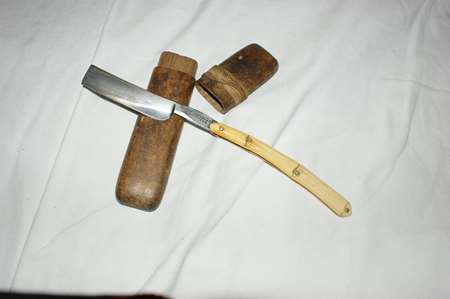First World War
Artifact W1-12: The Sinking of the City of Vienna and My Father’s Razor
Submitted by Errol Nugent

My father said that it was just before reveille when the City of Vienna suffered a huge jolt; came to a juddering stop, and began to list. The order to abandon ship was piped. “Most of us thought we’d been torpedoed”. The troops seized what they had close to hand and fled to the upper deck. Dad grabbed 2 nearby items without paying much attention to what they were, put them on the top of his head and covered them with his forage cap. Miraculously, the hat stayed on his head during his immersion and his rescue. What he had saved was a photograph and his cut-throat razor (photo above). He was pulled out of the water, half frozen and slightly groggy from a blow to his head dealt by his cork life-belt. Placed in a fast motor boat, he was taken to a small town on the outskirts of Halifax. Two months later, a storm swept the ship off the rocks into deep water where she sank.
Dad was an English orphan who, at age 12, was sent to Canada as one of the “Barnardo boys”. He was placed with a farm family in Eastern Ontario where he was badly treated and from which he ran away. Children’s Aid then placed him with the Maxwell family in South Hull where he continued doing farm work but was treated more like one of the family. Although he received no formal schooling, the family did secure a contract for him to deliver the mail. On his return from the war, he married a niece of the family, Annie Dowd, my mother.
He formally enlisted in the army with the 2nd Depot Battalion Eastern Ontario Regiment on May 6th, 1918 at age 18 although he may have made a previous attempt at age 16. Following the grounding of the City of Vienna and the subsequent rescue, most of the troops involved were almost immediately re-embarked on the SS Thongwa. My father recalled that some of them were reluctant to return to sea and in a few cases force had to be employed to get them on board. The Thongwa sailed July 10, 1918 from Halifax and arrived in England on July 22nd.
Upon his arrival in England, Dad was assigned to the 6th Canadian Reserve Battalion CEF in Seaford where he served until the 14th of June 1919 when he was formally re-assigned to the CEF in Canada having been promoted to Lance Corporal two months earlier. He sailed for Canada in the SS Belgic arriving on July 1, 1919. He was discharged 2 days later.
My father used the razor he rescued from the City of Vienna for the rest of his life. He kept it well-honed and used it with surgical precision. I can remember him stropping it in the mornings. When he died, it came to me as did his Bible.
